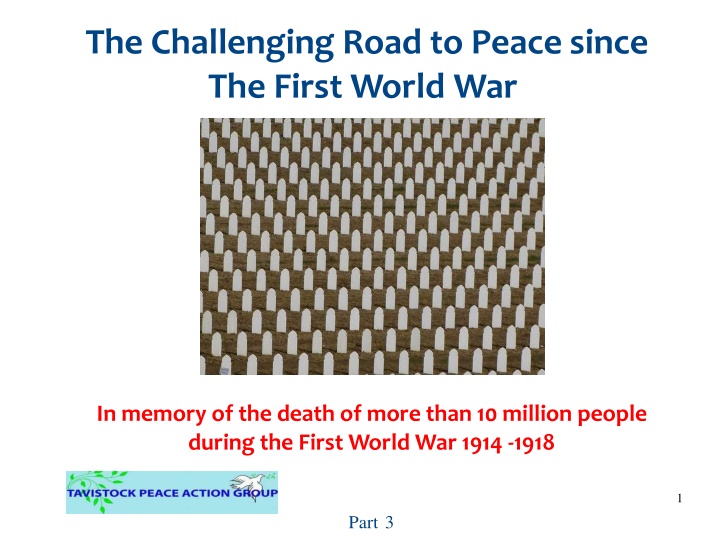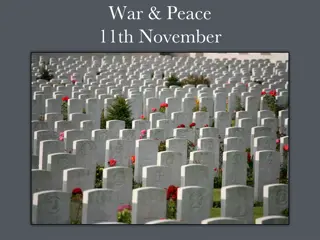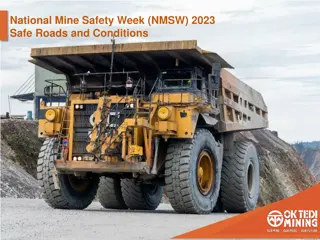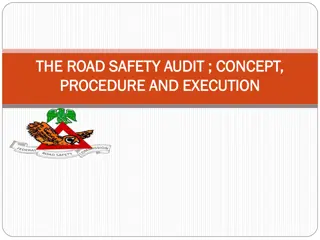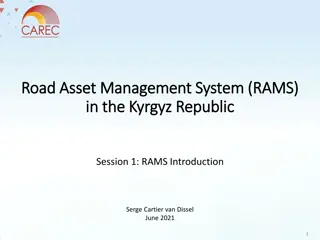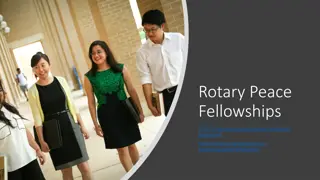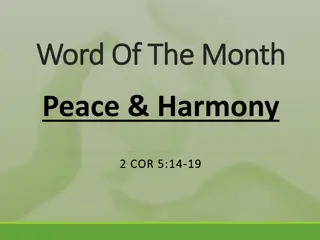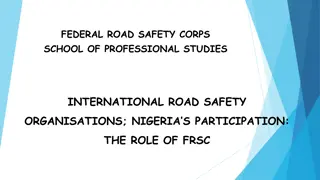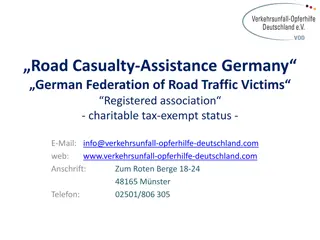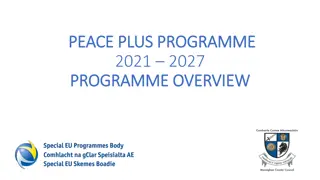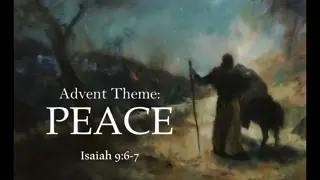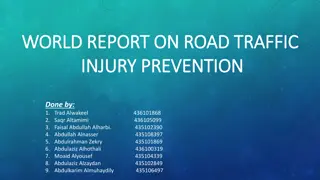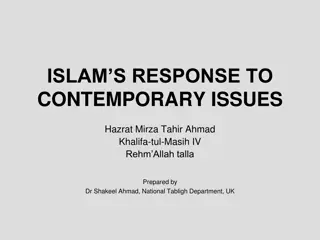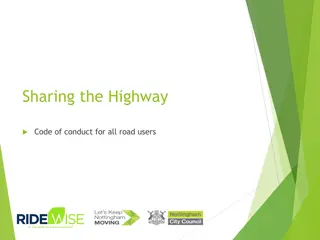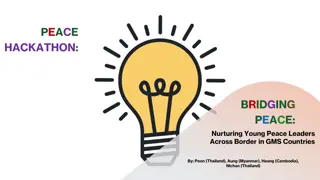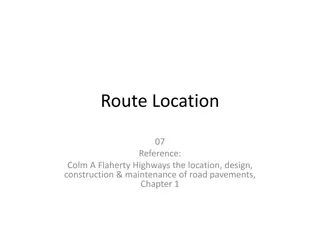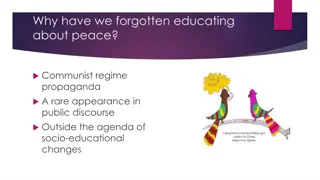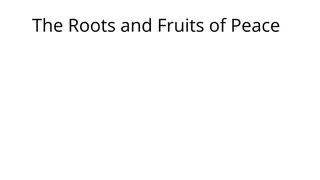The Challenging Road to Peace: International Efforts Since First World War
In memory of the millions lost in World War I, the journey to peace began with initiatives like the Red Cross, Geneva Conventions, and formation of international organizations promoting cooperation and conflict resolution. From the Inter-Parliamentary Union to the International Court of Justice, these endeavors have shaped a path towards global harmony through diplomacy, humanitarianism, and legal frameworks.
Download Presentation

Please find below an Image/Link to download the presentation.
The content on the website is provided AS IS for your information and personal use only. It may not be sold, licensed, or shared on other websites without obtaining consent from the author.If you encounter any issues during the download, it is possible that the publisher has removed the file from their server.
You are allowed to download the files provided on this website for personal or commercial use, subject to the condition that they are used lawfully. All files are the property of their respective owners.
The content on the website is provided AS IS for your information and personal use only. It may not be sold, licensed, or shared on other websites without obtaining consent from the author.
E N D
Presentation Transcript
The Challenging Road to Peace since The First World War In memory of the death of more than 10 million during the First World War 1914 -1918 people 1 Part 3
START OF CO-OPERATION BETWEEN NATIONS Red Cross Henri Dunant, Switzerland The Swiss social activist was shocked by condition of soldiers after the battle of Solferino in 1862 Founder of the International Committee of the Red Cross in 1863 Nobel Peace Prize 1901 2
Geneva Convention Founding of Red Cross led to the 1864 Geneva Convention, an internationaltreaty that covered the sick and wounded soldiers in the battlefield The Geneva Conventions and their Additional Protocols form the core of international humanitarianlaw, which regulates the conduct of armed conflict and seeks to limit its effects. They protect people not taking part in hostilities and those who are no longer doing so. 3
INTERNATIONAL ORGANISATIONS 1873 Institute of International Law, private organisation founded by lawyers from nine countries aimed to build a body of law governing relationships between states. Encouraged international arbitration to settle disputes. ( Nobel Peace prize 1904) 1889 Inter-Parliamentary Union founded by Frederic Passy (France) & Randal Cremer (UK) for political negotiation of conflicts 1891 International Peace Bureau founded in Switzerland to coordinate peace societies (Nobel Peace prize 1910) 1899 First Peace Conference inthe Hague created a temporary Court of Arbitration to settle international disputes. Also defined the conduct of warfare and war crimes. 1907 Second Peace Conference developed rules for warfare & laws on war crimes 4
INTERNATIONAL ORGANISATIONS 1910 Carnegie Endowment for International Peace Andrew Carnegie, American industrialist, donated $10 million to create an organisation with the aim of promoting cooperation between countries & making war more unlikely. It funded the International Court of Arbitration in a permanent home in Peace Palace in the Hague. Peace Palace in the Hague. 5
INTERNATIONAL COOPERATION European Union United Nations World Health Organisation (WHO) United Nations Children's Fund (UNICEF) United Nations Educational, Scientific and Cultural Organisation (UNESCO) World Food Programme (WFP) UN Peace keeping force The InternationalCourt of Justice in the Hague The International Criminal Court Internationalscience and space programmes 6
What makes a War more likely? Arms Race World spends $1,756,000,000,000 every year on arms. Over $200 for every child, woman and man in the world. New British nuclear missiles system, Trident, 100 billion. will cost Military-industrial unaccountable. complex is powerful, but 7
What makes a War more likely? Rise of nationalist parties United States centred view of the world Encouragement of the fear of foreigners Power of TV, the Press Internet and 8
What makes a War more likely? Ineffectual negotiating bodies Use of the veto in the United Nations Obstruction to International Criminal Court by United States Refusal of Israel to follow UN resolutions Lack of real nuclear disarmament required by the Non- Proliferation Treaty (NPT) 9
What makes a War more likely? War planning, military exercises Arming of brutal regimes NATO - obligation member countries to spend more on arms War seen as way of resolving international disputes Inappropriate power is held by military leaders Militarisation of children in schools Belief that 'My Country' is always right Seeing war as religious duty Intolerance of other cultures and beliefs. Fear of foreigners 10
What makes a War more likely? Economic interest Need for gas, oil, water, minerals, food Treaties that are advantageous to rich countries Belief that a country has right to obtain its needs by force The interference by a country in its neighbours affairs 11
What helps to keep a PEACEFUL WORLD? International cooperation European Union United Nations World Health Organisation (WHO) United Nations Children's Fund (UNICEF) United Nations Educational, Scientific & Cultural Organisation (UNESCO) World Food Programme (WFP) UN Peace Keeping Force The International Court of Justice in the Hague The International Criminal Court International science and space programmes Student exchanges 12
What helps to keep a PEACEFUL WORLD? Public participation The involvement of ordinary people in policy Politicians who represent the wishes of the people International negotiation Resolving disputes with the help of Internationalbodies Respect for law Respect for Treaties and Laws made by the United Nations 13
What helps to keep a PEACEFUL WORLD? Fair distribution of resources and wages Societies that care for all their citizens Human Rights Respect for the rights of all people Monitoring of abuses by, for example, Amnesty International Giving a sense of responsibility and a need to act Understanding and tolerance of other cultures Education about tolerance and conflict resolution in schools and the media 14
What helps make a PEACEFUL WORLD? Regional co-operation pacts OSCE - Organisation for Security and Cooperation in Europe USAN - Union of South American Nations Community of Latin American and Caribbean States African Union ASEAN Association of Southeast Asian Nations Economic interest Trading practices that help both sides Using negotiation rather than force to protect one s interests Regulation of powerful multinational companies WISE GOVERNMENT 15
TODAY'S CHALLENGES ON THE ROAD TO PEACE Arms T rade Every gunthat is made, every warship launched, every rocket fired, signifies in the final sense a theft fromthose who hunger andare not cold and not clothed. fed,thosewho are President Eisenhower ofUSA 1953-1961 (SupremeCommander AlliedforcesinEurope 1944-45) Annual US development aid budget is $32 billion Annual US Military's budget is $530 billion. The international arms trade, aided by the British Government, supports many corrupt regimes (Egypt, Saudi Arabia,Indonesia, Nigeria) with poor human rights records. The trade often supplies opposing sides. What can be done to control the armaments industry? 16
TODAY'S CHALLENGES ON THE ROAD TO PEACE Boy/Girl Soldiers: any child - boy or girl - under 18 years old who is part of any kind of armed force in any capacity defined by the United Nations Great Britain has youngest recruitment age in Europe: 16 years old. Great Britain blocked attempts by United Nations to make 18 years old minimum age for recruitment. Should children train to fight or train to mediate & resolve conflict? 1914 : Minimum age of recruitmentto the Armed forces = 18 Minimum age for service overseas = 19 2014: Minimum age of recruitmentto the Armed forces = 16 Minimum age for service overseas = 18 17 Is this progress?
TODAY'S CHALLENGES ON THE ROAD TO PEACE Trident Nuclear Missiles Each new Trident Submarine will carry up to 40 nuclear bombs. Each bomb is able to destroy a city. Is it right to threaten to kill millions of children, women and men in this way? Why do some retired military leaders say they can never be used? Should Great Britain spend 100 billion on such a missile system? Two thirds of the British people are against the renewal of Trident. Modernisation of the British nuclear missiles proceeds without adequate Parliamentaryscrutiny. What does this say about Democracy? 18
TODAY'S CHALLENGES ON THE ROAD TO PEACE Drones for Peace or War? Civilian Drones useful for observing traffic on the motorway, inspecting buildings or power lines, policing borders Military drones are used to kill terrorist suspects in foreign countries without declaring war. 200 children have been killed by American drones in Pakistan. Children have also died in drone attacks in Yemen by the United States and in Gaza by Israel. British drones are operated from UK base RAF Waddington to kill people in countries miles away. 19 ...............................Is this legal?
WHAT CAN ONE PERSON DO DIFFERENCE? TO MAKE A Why is it that countries which we call strong are so powerful in creating wars, but are so weak in bringing peace? Why is it that giving guns is so easy, but giving books is so hard? Malala Yousafzai, Nobel Peace Prize 2014 20
WHAT CAN YOU DO TO MAKE A DIFFERENCE? Find out more Quaker Peace and Social Witness Peace Pledge Union PAX CHRISTI Campaign for Nuclear Disarmament CAMPAIGN AGAINST ARMS TRADE Amnesty International Talk with your friends: Write to your MP: Write to the Newspaper: Become Informed 21
"Never doubt that a small group of thoughtful, committed citizens can change the world; indeed, it's the only Margaret Mead thing that ever has." End 22
